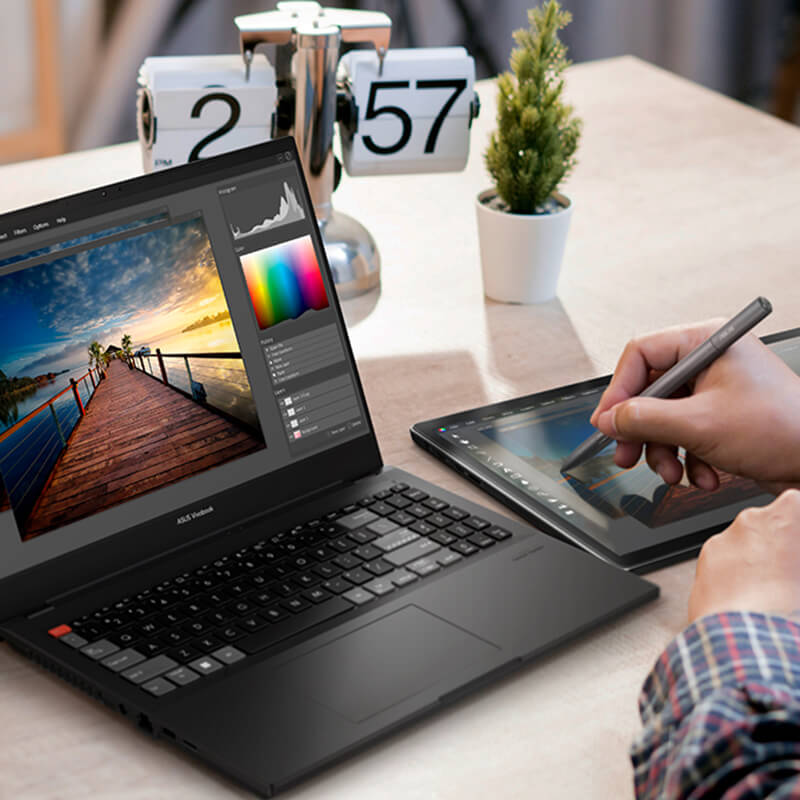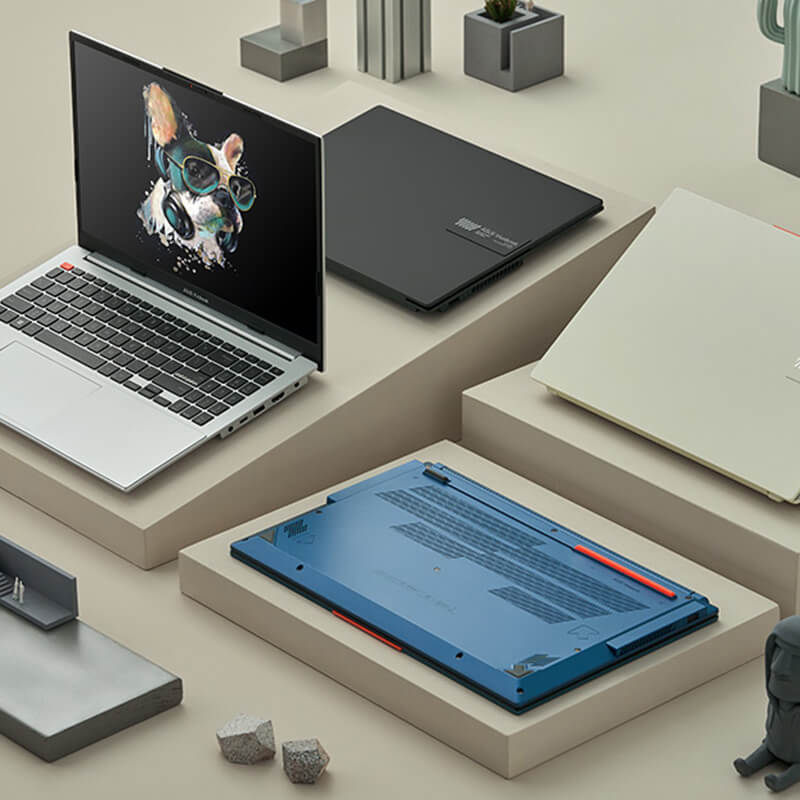
Nov 22, 2023
The way people study is evolving. Higher-education students have
become more mobile, often studying in different cities or even
countries. Additionally, many classes, assignments, and activities
have transitioned to online platforms. Meanwhile, innovative
learning models like hybrid learning and project-based learning are
gaining popularity.
This shift means that a significant portion of a college student's
learning occurs on a laptop rather than the traditional methods
involving textbooks and notebooks. But what makes a laptop
particularly well-suited for students' needs? Let's explore key
considerations to keep in mind when shopping for a laptop for
university or college students.
Dimensions and Form Factor
The most noticeable distinctions between laptops lies in their size,
weight, and form factor. For students, a compact and lightweight
design is crucial for easy transport between lecture halls and
during commutes. A 14-inch display strikes a balance, providing a
clear view while remaining compact enough to fit into most backpacks
or briefcases. Consider a laptop that is thin and light, aiming for
less than 2 cm in thickness and no more than 1.5 kg in weight.
You may also want to explore different form factors. While
traditional clamshell laptops are excellent, you may also consider
convertible laptops with a touchscreen. These devices are
comfortable for reading and ideal for taking handwritten notes or
collaborating via a virtual whiteboard. Convertibles come in two
popular types: those with a 360° hinge, such as the ASUS Vivobook S
14 Flip OLED, and those with a detachable keyboard, like the ASUS
Vivobook 13 Slate OLED.
Specifications
Your laptop should be powerful enough to handle all your coursework
with ease. While specific requirements vary by field of study, this
article focuses on laptops suitable for most majors, including
business, social sciences, languages, mathematics, and statistics,
where power-hungry software isn't a necessity. For creative studies,
you may require a more robust creator laptop.
CPU & GPU
At the core of every laptop is its processor (CPU). The CPU
determines how efficiently the laptop handles tasks and influences
its multitasking capabilities. For most students, a mid-tier
processor like the 13th Gen Intel® Core™ i5 or AMD Ryzen™ 5 7000
series should suffice. These processors comfortably handle common
tasks, such as word processing, internet browsing, video playback,
and video calling, even simultaneously. They are suitable for light
content editing and casual gaming.
Unless you need to tackle graphics-intensive tasks like content
creation or competitive gaming, an integrated graphics card (iGPU)
built into the CPU is sufficient.
RAM
For higher education, memory (RAM) plays a crucial role. The amount
of RAM impacts your laptop's ability to run multiple processes
simultaneously and handle large files without freezing. Aim for a
minimum of 8 GB, but 16 GB is more appropriate. Additionally, check
if the laptop allows memory upgrades via SO-DIMM memory slots, which
lets you add more memory in the future without replacing the entire
device.
Storage
Storage space is another critical consideration. To store necessary
files directly on your laptop, 512 GB is sufficient, but you may
eventually require cloud storage or an external drive for archiving
files. If you prefer relying solely on the laptop's internal drive,
opt for 1 TB.
Battery Life and Fast Charging
To avoid constant searches for power outlets and prevent your laptop
from dying during class or meetings, opt for a laptop with a robust
battery and fast-charging capabilities. A 70 Wh battery should last
an entire school day with prudent power management. Fast charging,
capable of at least a 60% recharge in an hour, is a valuable
feature.
Durability
As a student, you'll want a sturdy and dependable laptop that can
withstand the all rigors of your daily learning schedule. Many ASUS
laptops are tested to meet the MIL-STD-810H military-grade standard,
ensuring their durability. It's advisable to inspect the laptop
physically before purchasing, paying attention to factors like the
lid material (metal is best), build quality, hinge robustness, and
screen flexibility.
Display
With the extended screen time that's part and parcel of learning, a
high-quality display with good eye care features is essential. Look
for OLED displays, such as ASUS Lumina OLED, offering excellent
color accuracy, deep blacks, and 70% reduced blue light emissions
compared to traditional LCD screens. OLED displays also minimize
flicker and glare, reducing eye strain while providing wide viewing
angles, beneficial for collaborations.
Connectivity
Versatility is enhanced by having numerous connectivity options.
Consider laptops with a combination of USB Type-A® and USB Type-C®
ports. The inclusion of a USB-C charging feature is a significant
bonus. Built-in HDMI® ports are essential for connecting external
displays. Additionally, an audio combo jack is valuable for plugging
in wired headsets. For wireless connectivity, opt for the
latest-generation WiFi 6E and Bluetooth® 5.3 technologies for fast
and reliable connections.
Other Features Useful for Online Learning
For online classes and remote collaboration, select a laptop with
features that simplify video-calling, such as AI noise cancelation
or webcam image optimization. High-quality speakers with Dolby
Atmos® certification ensure clear, distortion-free sound. A physical
webcam shield adds peace of mind and enhances privacy.
Price
When shopping for a laptop, seek a balance between performance and
affordability. The ASUS Vivobook laptop family is known for its
reliable performance, durability, attractive design, and competitive
pricing, providing a wide range of options for every student.
Our Pick: ASUS Vivobook S 14 Flip OLED
For most students, the ASUS Vivobook S 14 Flip OLED is our
recommended choice. It's a convertible laptop with a 360° hinge and
a touchscreen, suitable for use as a clamshell laptop, a tablet, and
everything in between. This laptop strikes a great balance between
compact size and performance, weighing only 1.5 kg and measuring
less than 2 cm in thickness. It features a 14-inch NanoEdge display
with an 85% screen-to-body ratio, ensuring it comfortably fits in
virtually any laptop bag.
The laptop boasts a 2.8K OLED display with impressive color
accuracy, brightness, and reduced blue light emissions. With a
compact form factor, you can choose up to the latest-generation
Intel® Core™ i9 13900H high-performance CPU, up to 16 GB DDR4 memory
with an upgrade slot, and up to 1 TB of fast SSD storage.
Additionally, it's available at an attractive price.
If you'd like to learn more or find out where to purchase the ASUS
Vivobook S 14 Flip OLED, click the link below!
Discover the ASUS Vivobook S 14 Flip OLED











